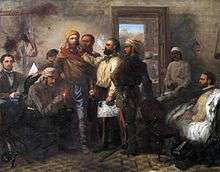Thomas Henry Kavanagh
Thomas Henry Kavanagh VC (15 July 1821 – 13 November 1882) was an Irish recipient of the Victoria Cross, the highest and most prestigious award for gallantry which can be awarded to British and Commonwealth forces.
Thomas Henry Kavanagh | |
|---|---|
_-_Google_Art_Project.jpg) Photograph by Felice Beato, 1858–1859 | |
| Born | 15 July 1821 Mullingar, County Westmeath |
| Died | 13 November 1882 (aged 61) Gibraltar |
| Buried | North Front Cemetery, Gibraltar |
| Allegiance | |
| Battles/wars | Indian Mutiny |
| Awards | Victoria Cross |
He is one of only five civilians to have ever been awarded the VC.
Details

He was 36 years old, and a civilian in the Bengal Civil Service during the Indian Mutiny when the following deed took place on 9 November 1857 at the Siege of Lucknow, India for which he was awarded the Victoria Cross:
Mr. Thomas Henry Kavanagh, Assistant Commissioner in Oude On 8 November 1857. Mr. Kavanagh, then serving under the orders of Lieutenant-General Sir James Outram, in Lucknow, volunteered on the dangerous duty of proceeding through the City to the Camp of the Commander-in-Chief, for the purpose of guiding the relieving Force to the beleaguered Garrison in the Residency, a task which he performed with chivalrous gallantry and devotion.[1]
An erratum appeared in a later edition of the London Gazette stating that the deed was actually performed on 9 November as follows:
The Act of Bravery for which Mr Thomas Henry Kavanagh has been awarded the Victoria Cross, was performed on 9 November 1857, instead of the 8 November, as stated in the London Gazette of the 8 July 1859.[2]
Further information
Kavanagh was one of only five civilians awarded the VC.
He died in Gibraltar on 13 November 1882, and is buried at North Front Cemetery, Gibraltar.
Kavanagh's Victoria Cross (and a first edition of his book, How I Won The Victoria Cross) is held by Historical-Militaria.com, a dealer in military memorabilia in Toronto, Canada.
In fiction
Kavanagh appears in George MacDonald Fraser's Flashman in the Great Game in which he is portrayed as a bungling glory-seeker who has to be led through the enemy lines by a reluctant and terrified Flashman.
References
- "No. 22283". The London Gazette. 8 July 1859. p. 2629.
- London Gazette
Listed in order of publication year
- T. H. Kavanagh How I Won The Victoria Cross (London, 1860)
- The Register of the Victoria Cross (1981, 1988 and 1997)
- Clarke, Brian D. H. (1986). "A register of awards to Irish-born officers and men". The Irish Sword. XVI (64): 185–287.
- Ireland's VCs ISBN 1-899243-00-3 (Dept of Economic Development, 1995)
- Monuments to Courage (David Harvey, 1999)
- Irish Winners of the Victoria Cross (Richard Doherty & David Truesdale, 2000)